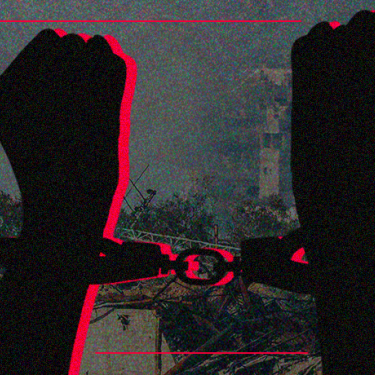31 Palestinian journalists currently held in Israeli prisons in record wave of detentions

Israel has arrested a total of 38 Palestinian journalists since the start of its war with Hamas on 7 October and is currently holding 31, most of them without any charge, says Reporters Without Borders (RSF), condemning the use of detention to silence the Palestinian media and calling for the protection of all journalists and the release of those detained.
Reporter Diaa al-Kahlout’s release on 9 January after more than a month in detention will not eclipse the scale of Israeli’s arbitrary imprisonment of Palestinian journalists. At least 31 of those arrested since 7 October – 29 in the West Bank, one in Gaza and one in East Jerusalem – are still held in Israeli jails, in most cases without being notified of any charge.
This unprecedented wave of arrests and detentions, while the war continues in the Gaza Strip, has clearly been carried out with the deliberate aim of silencing the Palestinian media. All of the detained journalists work for Palestinian media outlets such as J-Media, Maan News Agency, Sanad and Radio al-Karama or are freelancers.
Massive crackdown in West Bank
Most of the arrests have been in the West Bank. According to RSF’s tally, a total of 34 journalists have been arrested there since 7 October, of whom only five have so far been released. When the war began, two were being held. The detained journalists cannot receive visits and most are held in locations in Israel that have not been revealed.
Some of those who have been released, such as the freelancer Somaya Jawbara, who was granted on bail on 22 November, 17 days after her arrest, are required to remain at home, are banned from using the Internet or talking to the media, and have been placed under surveillance for an unspecified period.
Since the start of the war, Israel has been using the procedure known as “administrative detention” to detain journalists. Under this procedure, a person is detained without notification of any charge on the grounds that they intended to break the law. They can be jailed for periods of up to six months that can be renewed on nothing more than an Israeli judge’s order. At least 19 journalists are currently subject to “administrative detention.” The other 10 journalists are being held pending trial on trumped-up charges of inciting violence.
“At least 31 Palestinian reporters are currently held in Israeli prisons in connection with their journalism. This intimidation, this terror, these endless attempts to silence Palestinian journalism, whether by chains, bullets or bombs, must stop. We call for the immediate release of all detained journalists and for their urgent protection.
Inhuman treatment of detained journalists
Some of the detained journalists are being subjected to cruel, inhuman or degrading treatment. This was seen in the case of Diaa al-Kahlout, the newly released reporter for the Al-Araby Al-Jadeed news site. His family identified him in a video posted by an Israeli soldier in the north of the Gaza Strip on 7 December. Al-Kahlout was seen kneeling in the street in the middle of a group of half-naked detainees. An Israeli patrol had arrested him a few hours earlier at his home in Beit Lahia. His house was burned down. His two brothers, who had been arrested with him, were released. The reporter was briefly held in Eshel prison in Israel and was subjected to torture, according to several RSF sources. The Israeli authorities said nothing about his fate for more than a month, until his release today (9 January). In almost all cases of detained journalists, the families are given no information about their arrest and their situation.
Terrible ordeal for detained journalists in Gaza
In Gaza, where two journalists are currently detained, many reporters have been subjected to arrests of less than 48 hours in duration that have been no less traumatic.
They include Said Kilani, a photo-journalist who freelances for the Associated Press, Agence France-Presse and other international media, who was one of the few reporters to remain in Beit Lahia. On 13 December, Kilani was covering the fighting as Israeli forces advanced on Kamal Adwan Hospital when he found himself being arrested along with a medical team. “As I knew that journalists were being targeted by the Israeli army, I was afraid and I initially hid my helmet and my press vest,” he said.
Kilani was held for 14 hours at a military base in the north of the Gaza Strip. “We were forced to take our clothes off, we were insulted and humiliated,” he said, although he insists that he immediately identified himself as a journalist to those holding him. After being released, he found his wife and children, who had also been arrested and then released. While they had been held, their house had been set on fire, and the journalistic equipment that Kilani had hidden in the hospital had also been burned.
“The Israeli soldiers took everything from us,” he told RSF. “We are homeless, in the cold, with nowhere to go.” Five days after his arrest, Kilani was with his 16-year-old son when the boy was killed by an Israeli sniper before his very eyes.
Huge tragedy for journalism
At least 80 journalists have been killed in the Gaza Strip since 7 October, including 18 in the course of their work, according to information verified by RSF. More than 50 media offices in the Gaza Strip have also been completely or partially destroyed by Israeli strikes since the start of the war.
